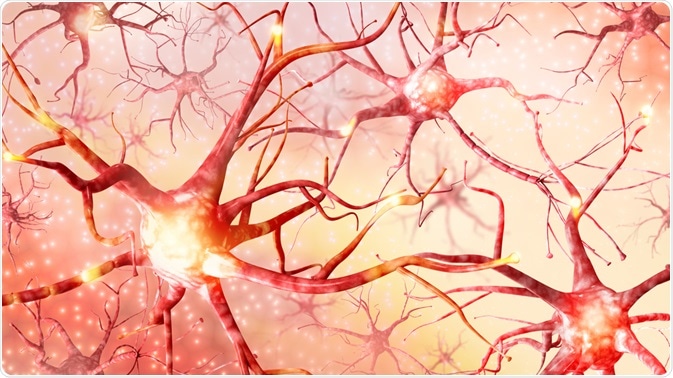Neurophysiology is a discipline within the health sciences that deals with the measurement and assessment of nervous system function, rather than the anatomy of the nervous system. This field helps to diagnose and monitor the progress of nervous disorders.

Image Credit: Romanova Natali / Shutterstock.com
What is clinical neurophysiology?
Clinical neurophysiology is a branch of neurophysiology that is hospital-based and involves the measuring of neurological parameters in a research setting, at the patient’s bedside, in intensive care units, or in a dedicated hospital laboratory.
Clinical neurophysiologists test and record the function of the brain, spinal cord, spinal nerve roots, peripheral nerves, of which include both sensory and motor nerves, as well as muscles, to help diagnose various disorders of the nervous system. These health professionals may use computerized imaging, as well as magnetic, electrical, or electronic ways to record nervous activity, nerve impulse conduction, and coordination with the muscular response.
Some conditions in which clinical neurophysiology is used include epilepsy, Parkinson’s disease, and motor neuron diseases.
Tests used in neurophysiology
Diagnostic evaluations that are used for neurophysiology assessments include electroencephalograms (EEGs), evoked potentials (EPs), nerve conduction studies (NCS), and electromyography (EMG).
EEG
The EEG is a record of brain function. Electrodes are attached to the scalp in various areas that correspond to the lobes of the brain to pick up the electrical potentials from the cortex of the brain. This is of particular use in patients suffering from epilepsy.
EPs
EPs occur in response to a visual stimulus. The clinical use of EPs can be found in neurological disorders such as optic neuritis or multiple sclerosis.
NCS
In many neurological conditions, it is necessary to test the way the peripheral nervous system (PNS) functions by measuring the speed of passage of the nerve impulses through the motor and sensory nerves. NCS are achieved by recording the effect of applying a small electrical current to the nerves of interest.
One type of NCS includes the nerve conduction velocity test, which helps to determine if the nerve has been damaged or destroyed. During this test, surface patch electrodes are attached to the skin. Whereas one electrode supplies stimulation to the nerve, the other records the resulting nerve impulse. The speed of conduction is calculated using by assessing the distance between the electrodes and recording the time gap between the stimulation and arrival of the resultant electrical impulse at the other electrode. Each nerve is tested separately.
Electromyography
Electromyography is a test that involces the insertion of slender electrodes into the voluntary muscles to diagnose conditions such as motor neuron disease and radiculopathy. Moreover, this test measures the electrical activity present within the muscle fibers and provides information on whether the muscles or nerves are damaged, and if so, to what extent and at what location.
Additional tests
Some of the more specialized tests that can be performed for a neurophysiology assessment include:
- Ambulatory EEG for long-term monitoring
- Video telemetry
- Sleep studies
- Monitoring patients during neurosurgical procedures, such as scoliosis surgery, where the spinal cord integrity has to be mapped throughout
- Tests of visual neuron functioning
Neurophysiologists may develop a greater interest in specific areas such as epilepsy and its origin as well as corrective surgery, Parkinson’s disease and sub-thalamic nuclear ablation, and mapping the cortex in various disorders.
The responsibilities of a neurophysiologist include supervising and supporting technicians in the wards, operation theaters, and departmental laboratories. They must report EEGs and interpret EMGs to diagnose various neuromuscular conditions.
References
Further Reading
Last Updated: Mar 11, 2023